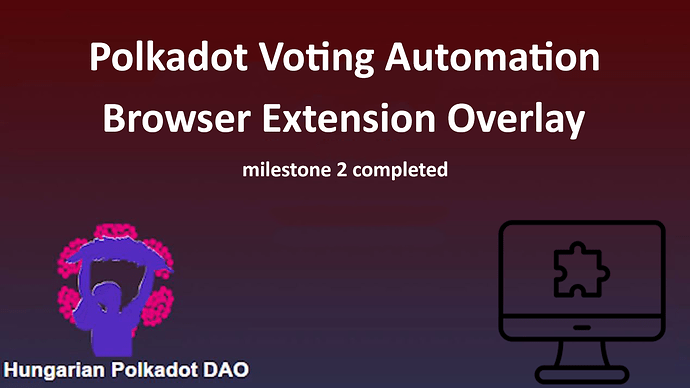We, as the ![]() Hungarian Polkadot DAO
Hungarian Polkadot DAO ![]() understand that demonstrating community interest is a key part of any proposal. That’s why we’d like to provide some background on why we’re sharing this on the Polkadot forum, and who is already using our Notion-based voting tool, which we have developed in the past months.
understand that demonstrating community interest is a key part of any proposal. That’s why we’d like to provide some background on why we’re sharing this on the Polkadot forum, and who is already using our Notion-based voting tool, which we have developed in the past months.
This voting tool was introduced to seven Polkadot community groups during our regional gathering in Warsaw this March (see post). At this community-driven event, representatives from seven Central European Polkadot communities participated. We presented the tool’s functionality and a recommended (but configurable) method of usage. After the live demo and workshop, we forked our own Notion-based workspace, integrated with the voting tool, and shared it individually with all seven communities.
To our knowledge, one of them, Bohemia Fam, aka the Czechish DAO has actively adopted the tool and continues to use it. They have also expressed interest in using it regularly going forward. This shows that some actors within the Polkadot ecosystem are not only interested in but already using the voting tool we’ve developed. We believe this tool can be especially useful for small, locally-organized communities and DAOs, where decision-making processes benefit from lightweight, adaptable governance tools.
This forum post aims to start a conversation and demonstrate that our voting tool deserves further attention and potential support from the Open-Source Development Bounty, with whom we’ve already initiated contact.
Our Voting Tool:
This voting tool is designed to enhance DAO governance by automating proposal management and voting processes. We have been using the voting tool since September 2024, throughout the months of the Decentralized Voices Program for Cohorts 3 and 4. In our view, the voting tool has been extremely helpful, it shortens our internal decision-making process while preserving the trustlessness of our votes, as we are still voting via a multisig.
Below, we outline its key offerings and how it stands out compared to other governance helper tools.
Setup guide:
Notion ( video guide included )
What the Voting Tool Offers
- Automated Proposal Management: Proposals are automatically imported into Notion with details like track, amount requested, links, and content. Prebuilt pages allow DAOs to evaluate proposals efficiently, followed by batch transaction preparation for multisig voting. Post-vote statuses update automatically in the Notion (e.g., ‘Voted Aye’; the extrinsic of the vote and the date of the vote).
- Proxy Voting Flexibility: Votes are cast from a proxy address controlled by the DAO’s multisig, enabling member adjustments without losing delegations.
- Time and Cost Efficiency: Using Mimir’s batching tool, multiple votes are cast instantly for a single $0.3 transaction fee. (Thank you for Mimir’s effort again for the collaboration!) This contrasts with manual voting, where 10-20 weekly votes in a 4/7 multisig could cost $12-$24 and take 15-20 minutes. For 400+ proposals in a cohort, costs drop from $150-$200 to just a $10-20.
- Notion Integration: Unlike tools relying on separate platforms, this tool uses Notion as a database, allowing parallel collaboration with DAO members within an existing task management system.
- Ease of Use: It’s relatively easy to set up, inexpensive to run, unit-tested, and well-documented for modifications and startup.
Governance tool options for DAOs right now:
We think our solution provides a solution for newly started DAOs to manage their votes and it probably won’t work well when DAO grows above 10-15 members. For that there are alternative solutions available from ecosystem builders those that built before us and we respect and love their products.
- Permanence DAO’s Telegram bot: Their Telegram bot handles proposal evaluation via Telegram. Using OpenAI integration to summarize comments and automatically post them is efficient. Pretty powerful setup for bigger DAOs.
- ChaosDAO’s Discord bot: Relies on a single voting method. Hard to see from outside what the reasoning is and it’s based on social trust. Still one of the best tools available for huge DAOs still we would love to see more efforts done on making the voting mechanism more decentralized.
- Trustless Core’s Google Sheets: While a google sheet is a very simple UI, which can be easily managed by anybody, it isn’t customizable and automated, and requires many manual actions.
- Hungarian DAO’s voting tool: The tool delivers a powerful, cost-effective, and integrated solution for DAO governance. By automating workflows, reducing costs, and leveraging Notion, it offers a powerful and versatile alternative to tools like Permanence DAO’s Telegram bot and Chaos DAO’s Discord bot or Trustless Core’s google sheet. With exciting future developments, it’s a compelling choice for DAOs aiming to streamline operations.
Future Enhancements and Ideas
- Decentralized Version: Plans include a decentralized alternative with DAO management tools and a simplified self-hosted setup.
- Simplified Installation: A setup interface requiring just a Notion API key could make deployment even easier on a VPS or self-hosted environment.
- Browser Extension: An augmented layer (e.g., a custom extension) could enable proposal evaluation directly on platforms like Polkassembly, with DAO members annotating thoughts in real-time, similar to Idriss.xyz’s Twitter tipping layer.
With this post, we’d like to open up the conversation to the community, feel free to ask any questions you may have. If you’d like to try out the voting tool, just send us an email at the address below, and we’ll set up a personalized voting tool interface for you in no time. Multiple people can start using it to make quick and efficient decisions on OpenGov.
Contact: polkadothungary@proton.me
Thank you for all your feedback and questions! LFG!
